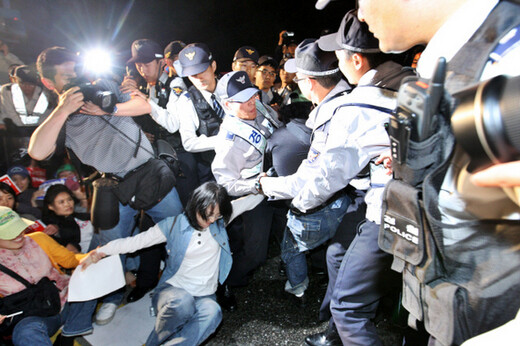hankyoreh
Links to other country sites 다른 나라 사이트 링크
[Analysis] Lee administration reversing democratic achievements

There are growing concerns that the administration of President Lee Myung-bak, who marked his first three months in office on May 25, has reversed some of the democratic progress that Korean society has made. For the first three months, law enforcement authorities, including the police, the prosecution and the Board of Audit and Inspection, have been mobilized to ingratiate themselves with the government’s initiatives. Regular meetings on public security with the National Intelligence Service, which were common under the military-backed government in the early 1980s, have been revived. The terms of the directors of public entities, which are guaranteed by law, have been ignored and an advisory opinion on the rights of migrant workers given by the National Human Rights Commission was overturned by a remark made by President Lee.
In a clear sign of a setback in progress toward democracy, riot police beat protesters and forcefully arrested them in the early morning on May 25 and 26 to disperse a street rally after a candlelight vigil was held to oppose the planned resumption of U.S. beef imports. Democratic achievements, obtained by the Korean people since the pro-democracy uprising in June 1987, have gradually been undermined. Human rights have been suppressed easily enough by intelligence authorities resuming investigations into members of the civilian population. With the government-controlled economic system showing signs of revival, the road to economic democratization has become rockier. Where the law ends, the politics of intervention begins.
Kim Ho-ki, a sociology professor at Yonsei University, who described the government of President Lee as “neo-liberal authoritarian rule,” said it is characteristic of the government to use “neo-liberalism to handle education, employment and welfare policies under market principles, while trying to control civic society and social movements with an authoritarianism similar to that employed during the Yushin (revitalizing reform) regime and the fifth government.” The Yushin regime and the fifth government, which date back to the 1970s and 1980s, constitute one of the darkest chapters in modern South Korean history. At the time, South Korea was ruled by military generals with most the basic rights held in abeyance. “Such a way of ruling is fundamentally opposed to the pluralism brought by the democratic era, so will amplify social unrest and discord,” Kim said.
Of the setbacks democracy has suffered, what’s most worrisome is the government’s attempt to control the media. The Board of Audit and Inspection, the Korea Communications Commission, and other government agencies are engaging in a full out attempt to force Jung Yun-joo, the president of the Korean Broadcasting System, to resign from the post. It is becoming clear that the government is trying to appoint people who are considered as “yes-men” to serve the administration of President Lee at posts in broadcasting, at news wires and media institutions, where the government has an influence on personnel appointments. Nevertheless, conservative media outlets, which had trumpeted the idea that they would protect media freedoms under the liberal governments of the past decade, have kept mum. The cozy relationship between powerful politicians and the conservative media, which put democracy into limbo until the 1980s, has returned.
Kim Hyeong-gi, a professor of economics at Kyungpook National University, said, “During the administration of former President Roh Moo-hyun, (the government) weakened the privileges of the major law enforcement authorities. But the government of President Lee Myung-bak has tended to strengthen its authoritarian rule while promoting the idea of a market economy. This phenomenon has occurred because the country turned conservative before the monitoring of law enforcement authorities by the National Assembly and civil society had taken root, and amid a lack of democratic maturity.”
Please direct questions or comments to [englishhani@hani.co.kr]
Editorial・opinion
![[Column] Park Geun-hye déjà vu in Yoon Suk-yeol [Column] Park Geun-hye déjà vu in Yoon Suk-yeol](https://flexible.img.hani.co.kr/flexible/normal/500/300/imgdb/original/2024/0424/651713945113788.jpg) [Column] Park Geun-hye déjà vu in Yoon Suk-yeol
[Column] Park Geun-hye déjà vu in Yoon Suk-yeol![[Editorial] New weight of N. Korea’s nuclear threats makes dialogue all the more urgent [Editorial] New weight of N. Korea’s nuclear threats makes dialogue all the more urgent](https://flexible.img.hani.co.kr/flexible/normal/500/300/imgdb/original/2024/0424/7317139454662664.jpg) [Editorial] New weight of N. Korea’s nuclear threats makes dialogue all the more urgent
[Editorial] New weight of N. Korea’s nuclear threats makes dialogue all the more urgent- [Guest essay] The real reason Korea’s new right wants to dub Rhee a founding father
- [Column] ‘Choson’: Is it time we start referring to N. Korea in its own terms?
- [Editorial] Japan’s rewriting of history with Korea has gone too far
- [Column] The president’s questionable capacity for dialogue
- [Column] Are chaebol firms just pizza pies for families to divvy up as they please?
- [Column] Has Korea, too, crossed the Rubicon on China?
- [Correspondent’s column] In Japan’s alliance with US, echoes of its past alliances with UK
- [Editorial] Does Yoon think the Korean public is wrong?
Most viewed articles
- 1‘We must say no’: Seoul defense chief on Korean, USFK involvement in hypothetical Taiwan crisis
- 2[Reportage] On US campuses, student risk arrest as they call for divestment from Israel
- 3[Column] Park Geun-hye déjà vu in Yoon Suk-yeol
- 4‘Weddingflation’ breaks the bank for Korean couples-to-be
- 5Korea sees more deaths than births for 52nd consecutive month in February
- 6N. Korean delegation’s trip to Iran shows how Pyongyang is leveraging ties with Moscow
- 7Amnesty notes ‘erosion’ of freedom of expression in Korea in annual human rights report
- 8Will NewJeans end up collateral damage in internal feud at K-pop juggernaut Hybe?
- 9N. Korean hackers breached 10 defense contractors in South for months, police say
- 10[Guest essay] The real reason Korea’s new right wants to dub Rhee a founding father